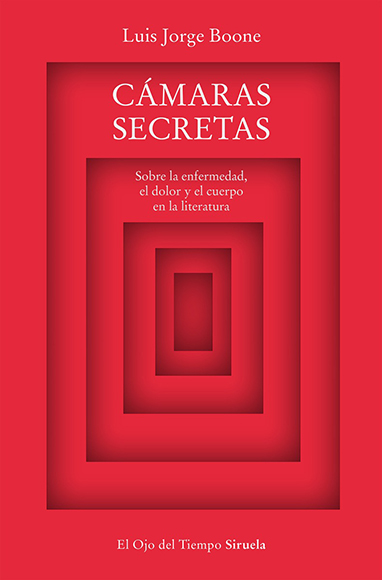
Luis Jorge Boone: Cámaras secretas. Sobre la enfermedad, el dolor y el cuerpo en la literatura
Una leona rampa de noche by Héctor Iván González recounts Román’s encounter with M, a mature woman who makes him her lover. Román, in his impetuous twenties, has dropped out of school to make money, thus abandoning his dream of becoming a writer. Meanwhile, M is part of Mexico’s economic elite. She avoids problems, which Román faces without measuring up the consequences. Such a difference is bound to generate unexpected conflict. He would do anything for her, which will prove fatal. Román has a good relationship with his boss, who will make him a confidant in the temptation of Nicole, a Franco-Mexican student. At the same time, Román befriends his colleague Daniel, who tells him about his adventure with Aurora, a sensual teibolera from Uruguay, whom he still hasn’t forgotten.

Héctor Iván González: Una leona rampa en la noche
Una leona rampa de noche by Héctor Iván González recounts Román’s encounter with M, a mature woman who makes him her lover. Román, in his impetuous twenties, has dropped out of school to make money, thus abandoning his dream of becoming a writer. Meanwhile, M is part of Mexico’s economic elite. She avoids problems, which Román faces without measuring up the consequences. Such a difference is bound to generate unexpected conflict. He would do anything for her, which will prove fatal. Román has a good relationship with his boss, who will make him a confidant in the temptation of Nicole, a Franco-Mexican student. At the same time, Román befriends his colleague Daniel, who tells him about his adventure with Aurora, a sensual teibolera from Uruguay, whom he still hasn’t forgotten.

José Homero: Función de Mandelbrot
Función de Mandelbrot is the most recent book of poetry by José Homero (Minatitlán, 1965). Divided into three sections, like a triptych, this title recapitulates love and sensory experience through the memory of senses and offers a transition from night to light. The allusion to fractals is due to the fact that, just as this geometric object repeats the same pattern on different scales, in a work of art the characteristics of the whole can be appreciated in any one of its manifestations: in a poem, for example, however random or fragmentary as it may seem.

Guillermo Santos: El siglo solitario. Ensayos sobre Bernhard, Kertész, Sebald, Weil y Jünger
“Guillermo Santos is a writer who possesses enviable qualities for anyone who wants to delve into the depths of the most daring and disturbing literature of the twentieth century. He is a born observer, and by that I mean someone who waits for the opportunity to know things in depth before filling us with judgments and opinions; he is also an unrelenting and lurking reader, who does not allow a book to get away without first having navigated it to his heart’s content. And finally, he has a delicate prose marked by the sincerity that wisdom offers when intertwined with youth and the authentic desire for knowledge.” – Guillermo Fadanelli.

Marxitania Ortega: Luz brillante
“The six stories that make up Luz brillante are connected by desire; there is a crack between the everyday nature and the longing of the characters, whose search for meaning makes them combust in the mysteries of their own light. Marxitania Ortega weaves her stories between santeros and Cuban drums; between hot water from the samovar and the aromatic pistachio sweets of a family home in Tehran, between hotels and taxis in hot Acapulco. In the diversity of settings, in the distinct concerns that go through the characters, desire is a permanent atmosphere. Light is a symptom of the fervor of the spirit, a guide for its paths, but also a loss: it cannot exist without its counterpart, its darkness.” – Daniel Armijo
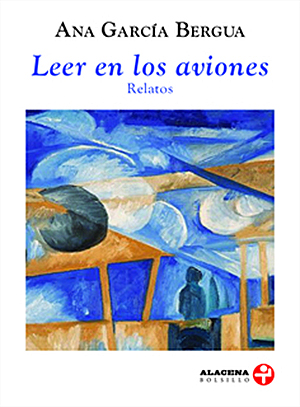
Ana García Bergua: Leer en los aviones
The fascinating tales gathered in this book tell the stories of journeys, displacements, and transitions. Accustomed to the trip or the idea of it, the characters gradually find a vital zone never visited before, which sometimes transforms them, and other times allows the flaw, mania, peculiarity, or weakness that identifies them to reach its extremes. In Ana García Bergua’s narrative, her exposition always calm and unhurried, the melancholy and humor of human lives emerges, interwoven. Stories of clandestine love, trips that end up separating married couples, everyday but disastrous journeys, unusual towns, wandering ghosts, dogs that get lost on planes, disturbing hotel rooms, small detours on the route that completely change the characters’ destinies.
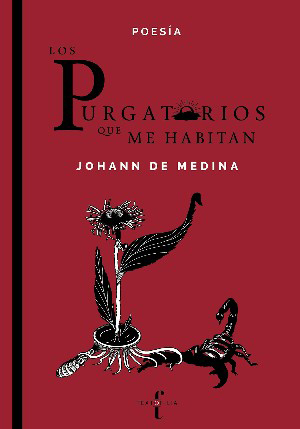
Johann de Medina: Los purgatorios que me habitan
“In Los purgatorios que me habitan by Johann de Medina (Mexico City, 1997), one perceives the care, dedication and, I would almost say, the attention of an entomologist that he applied to reviewing and editing the book. Such care might make us think this collection of poems was put together by an older poet, with literary cunning already worthy of wide renown. It should be noted that Johann’s poems are characterized by introspection and reflection, but also by ease, spontaneity, and a free spirit. But I don’t mean to say that this book boasts audacity or a lightness lacking in rigor, tout au contraire.” – Héctor Iván González.

Alejandro Vázquez Ortiz: El corredor o las almas que lleva el diablo
Alejandro Vázquez Ortiz (Monterrey, 1984) breaks the literary clichés that have marked the narrative of northern Mexico up to now, and has established himself as one of the most genuine and risky voices of his generation. El corredor o las almas que lleva el diablo, is an adrenaline-pumping story that places us in the middle of the highway, where an illegal race is about to begin. The industrial environment of the city of Monterrey amplifies the role of machines, truck engines that increase speed at the whim of their drivers, and that merge, at a certain moment, with their flesh. This is a novel about the violence of race cars, the unstoppable impulse to go forward: a work that emphasizes dehumanization, perversion, and, at the same time, human compassion.

Alicia García Berga: La lucha con la zozobra. La libertad bajo palabra en los poetas Xavier Villaurrutia, Gilberto Owen, Jorge Cuesta y Octavio Paz
This is not an academic book; it is a book by a poet about other poets. In it, the paths in search of poetic freedom that were allowed in Mexico since the beginning of the twentieth century are reviewed. Specifically, those of Xavier Villaurrutia, Gilberto Owen, Jorge Cuesta, and Octavio Paz, as a response that opens up to the present and unveils a new notion of poetic identity, apart from Romanticism. Above all, this book is a careful reading of texts that are worth pausing over and thinking about, in which we see how poetry makes its way by itself and through the new forms that its language discovers. Alicia García Bergua invites readers to delve into the plot and decipher it alongside her.

José Luis Prado: Migrar bordes
“To disappear is to become present, to manifest a desire, and to close your eyes and break the substance of the self. To disappear is also to evoke from immanence a position facing reality: that of the simulacrum. Thus, between dream and dream––or variations thereof––there is a risk of fading from memory and language to translate reality. In Migrar bordes there is a pavilion, a notebook, apostilles, sounding boards, medical prescriptions, and photographs, elements that are part of K’s identity, a simulacrum of himself, a Kubo Shunman, a Chuang-Tzu, the reflection in the mirror of a doppelgänger who recognizes himself in a crisis of thought and who, by questioning his presence, disarms his ‘double’ to build, adapt, plagiarize a character, a story, a life.” – Yussel Dardón
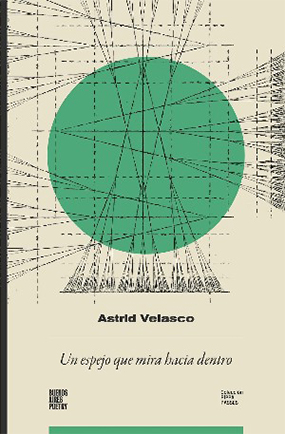
Astrid Velasco: Un espejo que mira hacia dentro
With a firm hand and a sensitivity that borders on exquisiteness, the Mexican poet Astrid Velasco brings, in her collection of poems, a set of poetic tesserae from an oblique view of reality. “Clarity,/ I invoke you/ the same in delight/ as in farewell.// Not for my tears or my anger,/ not for the sum of the wounds/ that weave insomnia.// I don’t want the lies that escalate creepers/ by the fence of your smile/ to calm the time/ that has to come to devour me.// Rage, surrender to silence.” Through Argentine publishing house Buenos Aires Poetry, Velasco breaks transnational limits and places herself on the other poetic shore.

Antonio Ortuño: La Armada Invencible
Antonio Ortuño presents a new novel, solidifying the position he has earned in the international literary world. The Mexican author brings us La Armada Invencible, a work that takes up the dream of so many young people in the nineties: to form a rock band. Barry Dávila, a man in his forties who dresses as a metalhead from the eighties, has a plan: to bring together “La Armada Invencible,” the heavy metal and thrash group with which he could have succeeded if only internal fights and a society deaf to the harshness of his music would not have barred his way. More than twenty years after the band’s dissolution, Barry seeks out his old friends, ailing and frustrated, to play together again and claim that unfinished past.

L. M. Oliveira: Las marcas del agua
Las marcas del agua recounts the forgotten story of a brotherhood that tried, in the mid-sixteenth century, to establish a place where harmony would reign, taking advantage of the journeys of Cortés, Magellan, and Luis de Carvajal. Almost in the twenty-first century, this company comes back to light, thanks to historian Teodoro de Villalpando. After the discovery of a lost and enigmatic newspaper that seems to refer to said brotherhood, the Spanish journalist living in Mexico, Juana Vicente––who is fleeing from an investigation that links Mexican politicians and drug traffickers to a scandalous fraud––decides to meet with the historian. Las marcas del agua is a novel of complex architecture and fine couplings, where the injustices of the past seem like an allegory of Mexico’s present.

Luis Pérez Oramas: La mano segadora
La mano segadora gathers poems from seven titles to date by Venezuelan writer Luis Pérez Oramas and offers a hint at four unpublished books. Put together by the author himself, this extremely personal anthology accounts for a writing process that, throughout almost forty years, remained firm in its profession to search for a voice, one that spins events, establishes poetic life, and vice versa. “For Pérez Oramas, such a voice seems to be endowed with an independent existence from the speakers. But this voice contains no words. Its poetics is due to the lost voice, the one that sets a trap that it already knows is useless,” says Adalber Salas Hernández in the epilogue of this book, which brings readers back to one of the most genuine and necessary voices of contemporary Venezuelan poetry.
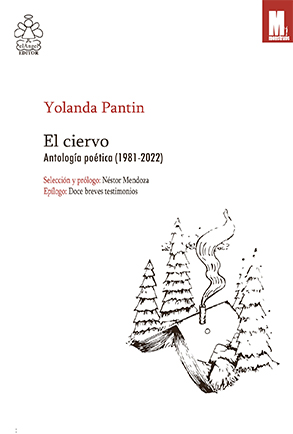
Yolanda Pantin: El ciervo. Antología poética 1981-2022
“Free from descriptive erotic forms, the voices of women poets fill every corner of literary criticism in the West. In this context, the poetry of Yolanda Pantin enters decisively, with detailed and beloved speech. She has created in readers of ‘learned poetry’ an effervescent relationship of affection and amazement with her work (as other great Venezuelan poets of her generation are also doing). Her poetry comes through a courageous discourse that surrounds the intimacy of the poetic voice: it involves her voice with a social tone, the prose poem, the epigrammatic and conceptual form, and the sober discourse of poetics with a certain heritage in English-language concrete poetry.” – Xavier Oquendo Troncoso
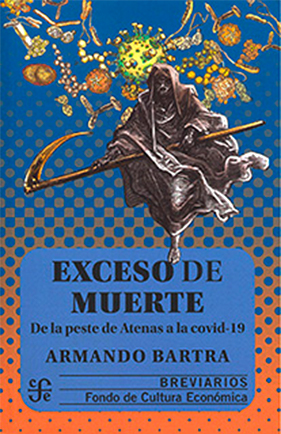
Armando Bartra: Exceso de muerte. De la peste de Atenas a la covid-19
Armando Barta takes a journey to explore the history of epidemics, their sociocultural backgrounds, and the way to deal with them, culminating in the current COVID-19 pandemic. The work compiles historical and literary testimonies through which it reflects deeply on the crisis of modernity, in which we find ourselves characterized by, in addition to the pandemic, climate change, economic and social inequality, and other issues. Finally, he invites us to rethink ourselves, our reality, and our relationships with nature and death. In the paradigmatic moment we live in, it is unavoidable to question our being.

Margarita García Robayo: La encomienda
The narrator of these pages lives five thousand kilometers away from her native country. She works for an advertising agency, wants to apply for a scholarship to go to the Netherlands to write, and does regular video chats with her sister. She sends her parcels, packages that include food, drawings of her nephews, and from time to time, a surprise, like an old photograph. Often, the food arrives rotten. With a masterful hand and remarkable economy of means, Margarita García Robayo leads the reader through the labyrinth of her protagonist and narrator in this unsettling novel that speaks to uncertainty, memories, fears, loneliness, family relationships, prospects of motherhood, and longings for the future.
Spanish-to-English translations by Jenna Tang


